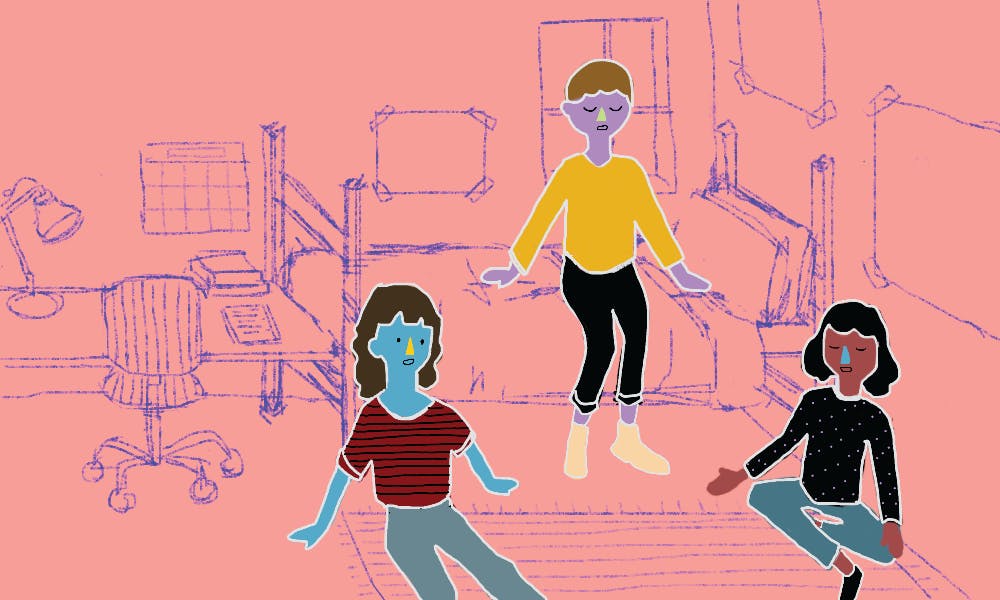A string of half-finished, half-baked conversations has followed me at Penn. You know the type — a quick catch-up on Locust, a rushed lunch date at Commons, small talk thrown around in dorm hallways. We are all too familiar with the language of busy people with important things to do.
There is a common structure to these exchanges. First, the back-and-forth of “How are you?” is answered with narrow glimpses into each other’s lives — a rough summary of homework assignments or an anecdote from last Friday’s parties. Then, the allotted time slot for social interaction is over, and you are left to patch up the missing details and unfinished thoughts. But don’t worry, there is an array of conversation clinchers to choose from. Classic lines like “Where are you headed?” or “I should get back to my work” or “I really need to go to office hours” lead to a perpetual raincheck on whatever was left unsaid.
And yet, in my mind anyway, there is always the yearning question of, “What if?” What if we had buried our fat pile of problem sets and responsibilities in some remote corner of our mind and let the conversation take over? What if we had enjoyed each other’s company for a bit longer?
Because the conversations that I have had where both parties did just that — committed themselves fully to listening and exploring ideas — have been my most transformational experiences at Penn. The mantra that you can learn more from a few hours face to face with another person than from a semester of lectures rings true — it’s the difference between absorbing information and committing it to heart. When you listen to someone, look in their eyes, watch emotions rush across their face, their ideas resonate with you much more forcefully, and you are more committed to understanding them. Sounds cheesy, but human connection hits harder than a textbook.
And this power works both ways. If you want people to care about what you have to say, make sure to get them comfortable enough to lose track of the next bullet on their agenda. How to do that? Listen to them first. It’s amazing how much people will warm up when you just shut your mouth and give them your attention.
One Wednesday night when I was close to drowning in a PowerPoint presentation, I collapsed onto the floor in my friend’s room. Gradually, more of my hallmates joined us and we conducted an experiment of sorts. The rules were simple. First, ask each subject the question: “Are you content?” Then, listen to them — really listen. That meant maintaining eye contact and only interjecting to ask open-ended follow-up questions.
“Am I content?” People initially responded with some combination of mistrust, confusion, and amusement. Gradually, they let the question sink under their skin, and then something incredible happened. They opened up, unraveled their thoughts, and evaluated their first semester of college with all its messy hopes and fears. They grappled with whether they had accomplished their goals what exactly those goals even were.
You would think that it would be easy to just listen to each other. Yet, we’ve built up so many impulses to pivot away and check out when the subject gets intense or hits a nerve. Especially when it’s as easy as glancing down at our phones.
SEE MORE FROM JULIA MITCHELL:
Results of the midterms are as underwhelming as both parties’ agendas
Don’t let Penn’s club recruitment rush rob you of your individuality
But what if we fought that impulse, engaged in more of those lose-track-of-time conversations? Admit it — we’re all eager to unlock the secrets of those incredible people in our midst. One of my friends responded to the “Are you content?” question with the steps that she was taking toward her goal of developing a humanitarian startup. Another discussed his experience on the board of a nonprofit. Yet another explored her ambition to design and market fashion.
It struck me then exactly why Penn is so incredibly lucky that these individuals chose to go to school here. And still, those parts of their stories tend to get lost in every day, half-baked conversations, since long-term aspirations don’t fit neatly into 15-minute time slots.
These moments of clarity — these full, effortless, open-hearted conversations that linger past three in the morning — make me remember exactly why I am grateful to be a student here. They remind me to build up a goal and pursue it wholeheartedly. And all it takes to reach this clarity is to ask, listen, and fight the impulse to check out at the first chance we get.

JULIA MITCHELL is a College and Wharton freshman from Yardley, Pa. studying international relations. Her email address is jcmitch@wharton.upenn.edu.









